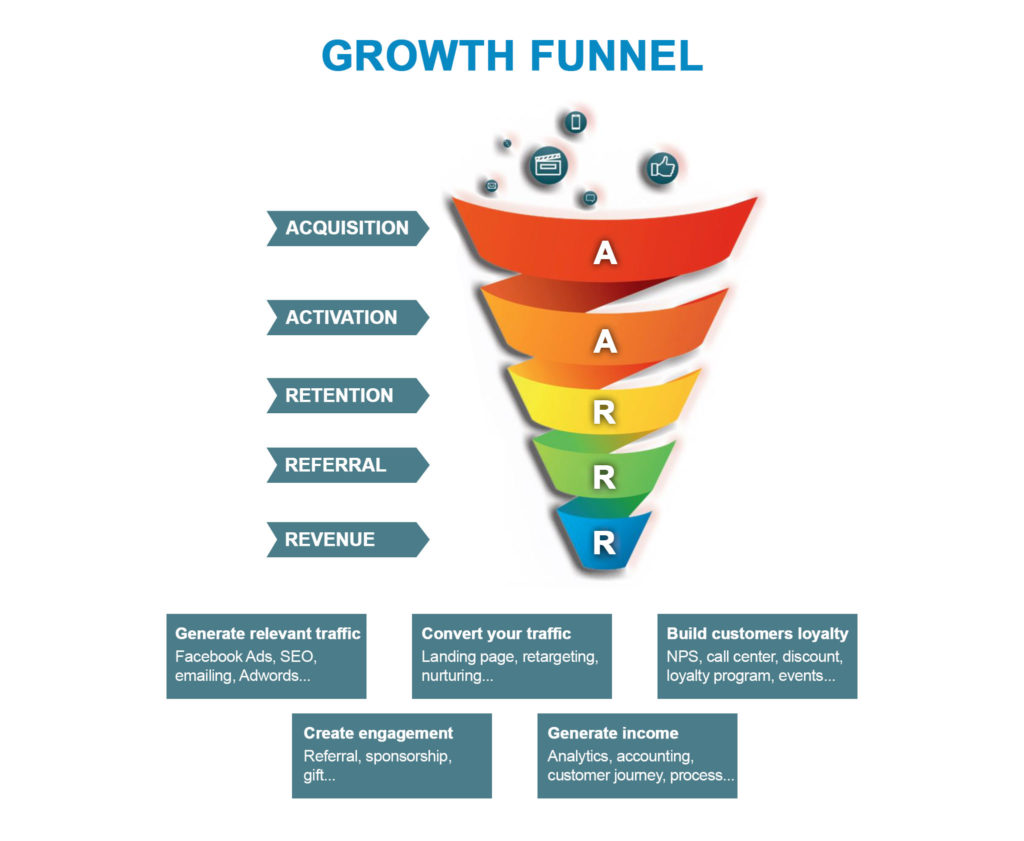What is Growth Hacking ?
« Growth Hacking », « Growth marketer », « technical marketer », « data-driven marketer », « T-Shaped marketer » ou « head of growth »,
this concept was introduced in the United States in 2010, and was first tested by Hotmail to accelerate the growth of a business while minimizing costs.
Invented by a former Dropbox employee, Sean Ellis, this “digital intelligence” strategy combines traditional marketing techniques with skills in consumer psychology analysis.
Every tactic, every iteration that the growth hacker undertakes, is driven by the growth of the business and the systematic connection of the target audience with the product or service. Different from the role of a marketing professional (more general and time-consuming in terms of budget), the growth hacker will deploy free or inexpensive “hack” techniques in order to drastically increase the growth curve of turnover, the number of customers, or market share.
This expert must also ensure that the growth achieved is sustainable. 5% retention translates into an inflection of the profit curve of 30% on average according to the marketer’s bible !
It relies on the “Agile Sprint“, to encourage experimentation, analysis-based decision making (Datadriven), and solution finding. This operating method gives the freedom to make mistakes in order to look for new angles of attack. About 10% of experiments are successful. It is therefore necessary to be persistent while learning from one’s mistakes !
It draws on the Framework to test the means available, to meet needs such as :
⌯ How to gain the largest audience ?
⌯ How to get more subscribers ?
⌯ How do I build customer loyalty ?
As a result, it is very popular with start-ups because of their limited resources, which prevents them from investing in large, expensive strategies. However, it is also suitable for large companies that want to innovate their sales channels.
The AARRR Framework
Implementing a growth strategy requires creating and combining several activities and thinking about working on specific objectives by prioritizing your ideas. This is where the “AARRR framework” comes in, an essential tool for any growth hacker that follow the customer’s life cycle in 5 metrics and measures their conversion through the sales funnel.
Each aspect of this framework can be measured individually, which provides a number of optimisation possibilities and a lot of room for improvement.
Applying and monitoring this framework on all growth activities implemented helps to identify those that have a real impact on the conversion rate and growth of the company.

Airbnb, a success story
Airbnb is the platform for renting out private accommodation which was created in 2008. In digital marketing, Airbnb is known for developing its customer base by diverting traffic from another website with a large audience. The creators had the idea of posting their Airbnb ads on Craigslist (Le Bon Coin American version), so when a user posted on Airbnb, it was also published on Craigslist. Thanks to growth hacking, the rental platform was able to quickly gain popularity with a large customer base.
Salary and skills
• Training :
There is no specific training called “Growth Hacker”. It requires having a strong appetite for the web and marketing field and acquiring the skills related to the world in which you will develop thereafter.
Directly after A-Levels, it’s possible to follow a 3-year Bachelor’s course in digital marketing.
⌯ After an undergraduate course, you are able to study a master’s degree in digital strategies. For beginners, there are also many courses, even online.
⌯ Nevertheless, having a degree in IT will make it easier to get hired.
• Skills and qualities :
The skills of a “growth hacker” are not predefined, it is most often a self-taught person, passionate about the web with technical skills (SQL, code, etc.) and who likes to learn. It is above all a frame of mind (Growth hacking Mindset)!
However, knowledge of social networks, SEO, web environment, knowledge of data exploitation, and project management will be useful to have under their belt.
They will also have to be creative, versatile, and know how to learn from their mistakes.
• Their playground :
Their objective is to create a positive image and an influx of traffic thanks to digital tools, but above all to increase the growth rate. They will have a variety of activities such as :
⌯ SEO / SEA
⌯ Data tracking and analysis (Google Analytics, Tag manager, CRM)
⌯ Web development (UI, UX)
⌯ Advertising
⌯ Community manager
⌯ Conversion, A/B testing
⌯ Inbound
⌯ Retention
⌯ E-mail campaigns
⌯ Automation of tasks…
• Salary :
The salary of a “Growth Hacker” is of course proportional to their level of expertise.
⌯ A junior role will earn around 35K €/year,
⌯ A senior role between 45K € and 50K €/year,
⌯ An expert role up to 65K €/year.
Finally, during the recruitment phase, it’s important to appreciate the difference in skills between “Growth Hacker” and “Growth Marketer” despite the fact that they share a common DNA.
The “Growth Hacker” is definitely a technical person who is able to implement workflows and APIs. They master front-end code and web scraping, which allows them to be very autonomous in their experiments.
These key players in multi-channel digital growth are particularly sought after by start-ups, scales-ups, other highly innovative organisations (incubators), and in Crowdfunding because they have a strong ROI culture.





